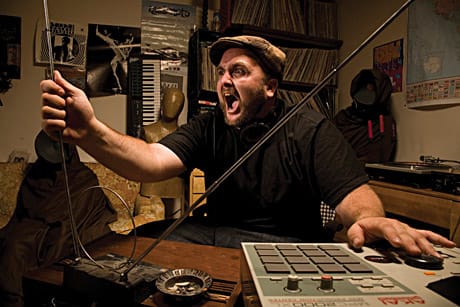Los Angeles-based artist Exile first gained a buzz in the '90s producing for MC Aloe Blacc as one-half of hip-hop duo Emanon. In 2006, he dropped a solo record called Dirty Science that featured Ghostface, Slum Village and Canada's own Kardinal Offishall, among others, but it was in 2007 that he gained the acclaim he deserved, partnering with MC Blu and producing every track on Below the Heavens, an album that definitively made known their names in hip-hop circles based strongly on word-of-mouth. The producer/MC born Aleksander Manfredi takes the next logical step and releases his first instrumental album, Radio, named after one of today's oft-disregarded mediums, which he mined for samples to give a voice to his thoughts and views. The result is 15 tracks of aural imagery, covering heavier topics such as politics, spirituality and religion, sampling people like philosopher Alan Watts and President George W. Bush over beats that are at times, abrasive and mechanical, at others lush and melodic. As a whole, the beats on Radio are more evocative than they are musical and as cohesive of a message as it may put forth, perhaps the only major drawback is the innately limited replay value that plagues most instrumental albums.
Why did you decide to sample from the radio?
I wanted to figure out a way that I could [make an instrumental album] different from everybody else. I didn't just want to put out a beat record; I wanted to be able to have a voice within the instrumental record, so vocal samples are how I did it. With all the other records, another artist is able to communicate what he's learned from life and I wanted to be able to do the same thing with an instrumental project, because usually I've got MCs on my stuff. I feel like I was able to bring across some of my beliefs and how I feel politically and spiritually through that and so I was able to communicate with the listener what I've learned by doing that.
Are there a few tracks that have more significance than others?
Yeah, "The Sound is God" is one of my favourites. That and the message in "It's Coming Down," and the opposing message of "The Machine." Basically, the machine represents the powers that be, the evil powers that be, and then "It's Coming Down" follows it and it's kind of the answer to that and just kind of encourages people to be spiritual. [As for] "The Sound is God," to me, everything is God. I was listening to one of Alan Watts's speeches on the radio and the part that I sampled for the record just further conveys the message of everything being God and of humans being one.
(Plug Research)Why did you decide to sample from the radio?
I wanted to figure out a way that I could [make an instrumental album] different from everybody else. I didn't just want to put out a beat record; I wanted to be able to have a voice within the instrumental record, so vocal samples are how I did it. With all the other records, another artist is able to communicate what he's learned from life and I wanted to be able to do the same thing with an instrumental project, because usually I've got MCs on my stuff. I feel like I was able to bring across some of my beliefs and how I feel politically and spiritually through that and so I was able to communicate with the listener what I've learned by doing that.
Are there a few tracks that have more significance than others?
Yeah, "The Sound is God" is one of my favourites. That and the message in "It's Coming Down," and the opposing message of "The Machine." Basically, the machine represents the powers that be, the evil powers that be, and then "It's Coming Down" follows it and it's kind of the answer to that and just kind of encourages people to be spiritual. [As for] "The Sound is God," to me, everything is God. I was listening to one of Alan Watts's speeches on the radio and the part that I sampled for the record just further conveys the message of everything being God and of humans being one.
